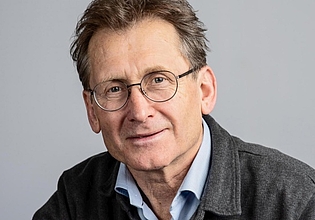Interview
“Oh, it's moving, so it's alive!“
Interview Nobel Laureate Ben L. Feringa

Photo: University Groningen
“The Art of Building Small” is the title of the evening lecture on Wednesday, 15 February 2023 at the Leopoldina in Halle (Saale). It will be given by the 2016 Nobel Laureate in Chemistry Ben L. Feringa, who has been a member of the Leopoldina since 2019. In an interview, Feringa talks about his research in the field of molecular nanotechnology.
Your molecular machines are inspired by nature. What kind of machines do organisms build?
Ben Feringa: The fact that I can speak to you, the fact that you can move your arms and legs, that substances are transported in your body – all this is due to tiny motors and machines, billions and billions of them. ATP, the most important fuel in your body of which we produce up to 40 kilograms per day, is made by a rotary motor. If you want to know if something is alive or dead, one of the first things a child will say is: “Oh, it's moving, so it's alive!”
Mechanics is normally a discipline of physics. Why is chemistry so important at the molecular level?
In his famous lecture “There’s Plenty of Room at the Bottom” the physicist Richard Feynman developed the first ideas of technology on a molecular scale. That was 60 years ago. What happened since then was mainly a scaling down of macro-technology. We built smaller and smaller devices – look at your laptop and your smartphone. But what Mother Nature does is to build bottom up instead of top down, from nanoscale to larger scale dimensions. And that’s typically what chemists and materials scientists do.
Are you trying to imitate Nature’s constructions?
Once the stage for life was set, nature had a very limited set of materials to work with. Most of the essential parts of your body are built of 20 amino acids, that’s it. But we are not limited at all by this because we can make endless materials. A Boeing 747 is not an upgraded pigeon, and our constructions are not modified natural machines, although I admire the beautiful design of Mother Nature.
The conditions at the molecular scale are very different from what we experience in the macro world.
That‘s right. There is a phenomenon called Brownian motion – molecules move like crazy. Some people have compared it to constantly walking in a hurricane.
What are the main obstacles when working under these conditions?
Chemistry is extremely good at building all the materials that sustain modern society, but we are not very good at making anything that moves. Think about an artificial muscle, think about a piece of plastic that can change shape or can repair itself. But this is what happens in your body – if you have a scratch on your finger it heals itself. Now for the first time we can make things that can move autonomously. We have made the first motor in the world which is less than one nanometer in size.
You also built a little nano-car.
Yes, and the scientific challenge was of course not to build an actual car, but to transform rotation into translational motion.
What are the applications of this technology?
The main application we are looking at now is controlling surface properties, for example when growing stem cells. We also published work on a molecular muscle last year. We organized millions of our molecular motors in water, and when we hit them with light, the energy makes them move so that we can grab a piece of paper.
We have heard a lot of stories about nanobots. Is this coming?
This is of course still science fiction. But I predict that 50 years from now a doctor will inject these nanobots in your bloodstream to go search for a tumor cell or to deliver a drug. But I think the first applications will be self cleaning windows and self-repairing materials. There is already a kind of plastic that you can cut and then it heals within ten minutes. The nanorobotics, that's a little bit further away. But looking at the possibilities, it is fantastic what is waiting for us in the future – if we do it in the proper way.
What does the membership in the Leopoldina mean for you?
I value these communities of the best scientists like the Leopoldina a lot. I think it is more important than ever that the academies raise their voice to politicians and to society to tell fact from fiction and to propagate quality of thought. So being elected as a member of this prestigious academy means a lot to me.
Are you going to participate in Leopoldina working groups or committees?
After my Nobel prize I got a lot of new responsibilities and invitations. So it's more a matter of time. I have many connections with German universities and with the Max Planck Institutes, and I would be more than happy to be involved.
Further information
Lecture “The Art of Building Small”
Wednesday, 15 February 2023, in Halle (Saale)
